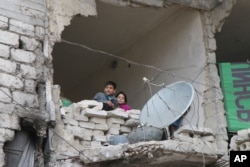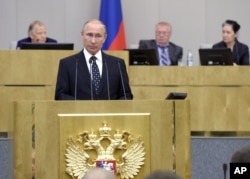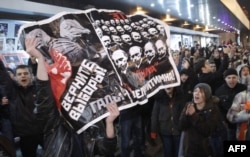Russia on Wednesday suspended a three-year-old agreement with the United States on cooperation on nuclear and energy-related research — the latest move signifying a deteriorating bilateral relationship.
"It's frankly concerning," a senior U.S. official told VOA on condition he not be named.
Russian President Vladimir Putin on Monday also signed a decree suspending an agreement with the U.S. on disposing weapons-grade plutonium, citing "unfriendly actions" by Washington — a reference to U.S.-led sanctions on Moscow for its actions in Ukraine.
Nullifying the plutonium pact is "a real tragedy because these are areas where we have successfully cooperated in the past," State Department spokesman Mark Toner said during Wednesday's daily briefing.
The United States has halted Syria cease-fire direct talks with Russia amid continuing military attacks against civilian targets, with the U.S. administration declaring its patience at an end with Moscow. However, Secretary of State John Kerry and Russian Foreign Minister Sergei Lavrov spoke again Wednesday about Syria.
Diplomats in both Washington and Moscow say the United States requested the call, which also covered the situations in Ukraine and North Korea.
There was also face-to-face, high-level U.S.-Russian engagement Wednesday in Moscow with Victoria Nuland, U.S. assistant secretary of state for European and Eurasian Affairs.
Nuland, accompanied by members of the National Security Council, met with Russian officials, including presidential aide Vladislav Surkov. They discussed the 2015 cease-fire and peace agreement for Ukraine, known as the Minsk Protocol.
U.S. officials insist that despite all of their disagreements with Russia when it comes to achieving a solution for Ukraine, "we still believe the Minsk process remains the best way to get there," Toner said.
Global influence
Besides Ukraine, Russia is staking its reputation on whether it can keep its ally, President Bashar al-Assad, in power in Damascus and can ensure Syria's reviled government, which is confronting numerous enemies on the battlefield, is able to maintain territorial integrity.
Addressing the new State Duma on its first official day of work Wednesday, Putin stressed the importance of maintaining global influence.
"Every nation and every country has the right to be powerful, as does [Russia]," Putin said. "Our power is in ourselves, in our nation and our people, in our traditions, our culture, our economy."
Throwing aside agreements that "are not terribly important but have symbolic value" are a way for Russia to try "to raise the cost of having bad relations with Russia," Henry Hale, George Washington University professor of political science and international affairs, told VOA.
‘Never acknowledge, always counterattack’
As far as alleged Russian responsibility for atrocities in Syria and other actions for which it is harshly criticized by the international community, the Kremlin's tactic is to "never acknowledge, always counterattack," Mark Galeotti, a senior research fellow at the Institute of International Affairs Prague, wrote in an article for Foreign Policy. "Moscow believes such gambits are successful because the West is at once cynical and easily distracted."
Among the most recent alleged controversial action taken by Moscow are cyberattacks intended to undermine American public confidence and disrupt the U.S. election process.
Some analysts caution there may not be an overarching goal tied to such actions.
"Is there any strategic thrust to what the Russians are doing in cyberspace … or is it all improvisation?" asks Martin Libicki, a professor at the Pardee Rand Graduate School and distinguished visiting professor at the U.S. Naval Academy.
"Just because the Russians are doing something tactically doesn't mean there is a strategy attached," Libicki said Wednesday during a discussion at Georgetown University's Center for Security Studies. "In Russia, everything is subsumed to psychological operations."
‘Messing’ with U.S.?
Hale, who is also co-director of the Program on New Approaches to Research and Security in Eurasia, characterizes it as Moscow flexing its muscles to say "look, we're here, we can mess with you … we can do some of the same types [of things] to you we see you doing to us."
Reports say the Russian president blamed former Secretary of State Hillary Clinton for being behind protests in Moscow in December 2011 — in which demonstrators accused Putin of rigging elections — at the same time she spoke of a "reset" in relations with Russia.
Some analysts, such as Hale, expect Putin to continue to engage in brinksmanship and play up a perceived threat from the West ahead of the planned 2018 presidential election in Russia.
But the Kremlin "doesn't want things to spin out of control" and while misunderstandings could happen, "all sides in the end are in control enough of their actions to avoid something really catastrophic," Hale told VOA. "I don't think they're interested in outright conflict with the United States and NATO. Because such a serious confrontation could "pose problems [at home] for the Putin administration, as well," Hale added.
"The bottom line is, in some ways, Russia's leadership really does want cooperation with the West, with the United State, with NATO," Hale said. "The question is on whose terms this cooperation is going to be."








